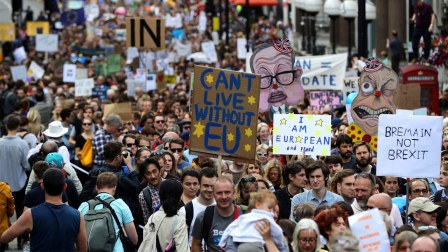Is A Brexit Do-Over Vote Likely?
It may seem like the entire world is unhappy with the U.K.’s Brexit vote to leave the EU. But is a do-over possible?
That’s been one of the many story lines following the saga ever since the historic vote. What is the timeline for leaving the union? Or more important to those who voted “Remain,” is there a way to stop the exit from happening?
Over the last few weeks, some news stories appeared that alluded to a revote. The idea behind it was that many people who voted “Leave” regretted doing so, thinking the overwhelming majority was going to vote “Remain.” In fact, an online petition began to circulate that called for a revote, and it has amassed more than 4.1 million signatures so far.
All the same, whether or not a revote could happen remains unclear at best.
One prominent reason why a new referendum is unlikely is that the data right now is mostly anecdotal. While many people are taking to social media to say they have second thoughts about voting “Leave”, there has been little polling about how many people there actually are.
According to Matt Singh, a U.K.-based election and opinion polling analyst who runs the site Number Cruncher Politics, Britons having second thoughts are in a very small minority, based on the little bit of data collection that’s been done post-Brexit vote. “The overwhelming majority of people who voted Leave still support Leave,” he says. But even with that general sense, the polling in the last few weeks is anything but robust.
Singh’s ultimate point is that it’s still too early to know what’s about to happen. “We need to wait a little longer,” he says.
Barring that, the actual process of a new referendum would involve overcoming a series of hurdles. The most pressing issue would be finding an election to put the referendum on the ballot. As it stands now, it’s unlikely that simply because people are unhappy with a turnout, that could spur an entire revote. Instead, if a general election is held in a few months (which is now looking more unlikely because David Cameron stepped down as prime minister, and if the Conservatives called for a general election, there’s a chance they could be unseated), it’s possible the question could be revisited if the consensus appears to have been changed. Beyond that, the next scheduled general election is in 2020, which will definitely be too late.
Historical Precedent
Historically there have been a few revotes, but not anything close to the Brexit situation. Perhaps most similar was another referendum for the Lisbon Treaty, which is an EU pact to give the organization more power and integrations. The treaty needed to be ratified by all of the participating countries, and Ireland shot it down in 2008. A year later, after key amendments were made, Ireland voted on it again and the Lisbon Treaty passed.
Related: How Will Brexit Impact The U.K.’s Innovation?
At first glance, there may be some parallels with the situation—most glaringly, it having to do with rejection of EU powers. But the Lisbon Treaty was a much more nuanced issue than Brexit and likely had required a more thorough understanding of what the the agreement would do. Brexit, on the other hand, is clear in its very name. And, as Singh points out, the Lisbon Treaty rejection was a vote for the status quo. Since Brexit was a vote for change, which is historically a much harder sell, it’s a markedly different issue than most other referenda looking for a revote. “It’s far more significant,” he says.
Another important point is that the Brexit vote brought in record numbers. In fact, it had the highest turnout of any U.K. election since 1992, says Singh. The reason is likely because it represented an issue that felt closer to home than most other elections. This makes it even tougher to argue that the original vote wasn’t representative of the British populace. Someone representing the Leave campaign would likely say that the Brexit vote was in fact more representative of the country’s population than ever before. Of course, once the reality of leaving the EU comes to pass, the perception could change. All of this hinges on how the road map is laid, and whether or not free trade between the U.K. and the EU is significantly hindered.
The road now is still hazy. While anti-Brexiters are still very vocal, the likelihood of a new vote seems rather unlikely. Another outcome: Parliament flat-out opposes the vote. That, however, could lead to widespread democratic outrage. Thus the country is in uncharted territory and will need to regroup to figure out the proper course.
And, for now at least, a loophole seems unlikely. As Singh puts it, “it seems as though Brexit means Brexit.”
Fast Company , Read Full Story
(19)


